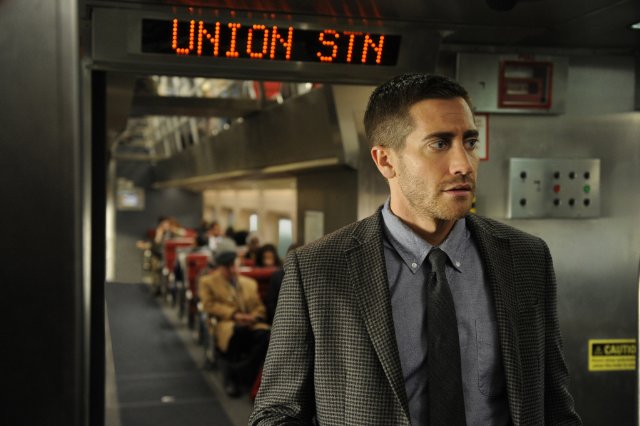Source Code
12ABritish director Duncan Jones made quite an impact with his impressive debut feature Moon; so much so that there’s been a keen eagerness from its admirers to see what this new wunderkind-in-the-making could produce next.
Deciding to make a film with more atmosphere, Jones has returned to terra firma for his latest film Source Code, starring Jake Gyllenhaal.
After waking from a brief forty winks, Captain Colter Stevens (Gyllenhaal) finds himself on a speeding commuter train. The problem is, he has no recollection of how he got there. More curiously, the woman opposite him, Christina (Michelle Monaghan), is talking to him as if she not only knows him, but as if he’s supposed to know who she is.
To add to this bucket of weird, Stevens visits the toilet, where he’s faced with even more confusion: the person in the mirror isn’t him. Then suddenly, the train explodes.
Stevens now finds himself inside a capsule, where he can communicate with army officer Carol Goodwin (Vera Farmiga) via a screen. Thankfully she does know who he is; not only that she explains to him what it is that’s going on: he’s part of an experimental computer program known as the Source Code. This code allows someone to cross over into someone else’s body for the last 8 minutes of that person’s life.
The reason the train he was on exploded was because a bomb had been planted on it. Using the source code, they intend to send Stevens back to the train as often as they can; not only to diffuse it, but more importantly, to find the man that planted it. If he doesn’t manage to find him, it’s not only the train he’s on that ends up exploding, but the entire city of Chicago is under a far bigger explosive threat.

God, I hate public transport. Not only is there nowhere to sit, but I haven't a clue where this train is going.
It all sounds a bit complicated, and granted in places, it is. The easiest way to describe it is Hitchcock meets Groundhog Day with bombs, in that it’s a fast-paced thriller that returns to the same scene of the crime again and again.
The actual source code is fairly similar to the matrix in that even if you had a PHD in Knowitall, it would still be impossible to explain. Thankfully the film’s breezy pace doesn’t manage to get bogged down too often from the ‘here’s the science’ bits. That said, its ending is clearly taken from Inception’s ‘How to Leave Your Audience Scratching Their Heads’ book; sometimes though, you just have to roll will a certain amount of sci-fi ambiguity.
What does come across however is the director’s love, affection and respect for the science fiction genre. He likes to give his audience a little more credit than to spoon-feed them mindlessly all the way. He also gets a great performance from Gyllenhaal, who is proving that anything Matt Damon can do in action man mode, he can do just as well, if not even better. In fact Damon’s recent sappy The Adjustment Bureau should have delivered more on its promise of sci-fi as this one clearly has.
As well as having the space-age stuff in common with his debut Moon, Jones also re-visits the theme of identity too, albeit briefly. Gyllenhaal’s character embarks on quite a journey, both physically and mentally; not only does he battle with an identity crisis, he’s also constantly confronted with his own mortality. Oh and attempts to save the world to boot. Gyllenhaal not only juggles all this emotional baggage like a psychic Chris Bliss, but he does so with a charming smile on his face.
Source Code does at times feel like it stretches itself a little too thin in its attempt to appeal to both a cerebral audience as well as the all-out-action crowd, but overall it works, with both camps walking away from it suitably appeased.
With its constantly regurgitated train wreck, just like rubbernecking in real life, you’ll find it difficult to pull your gaze away from the action.
